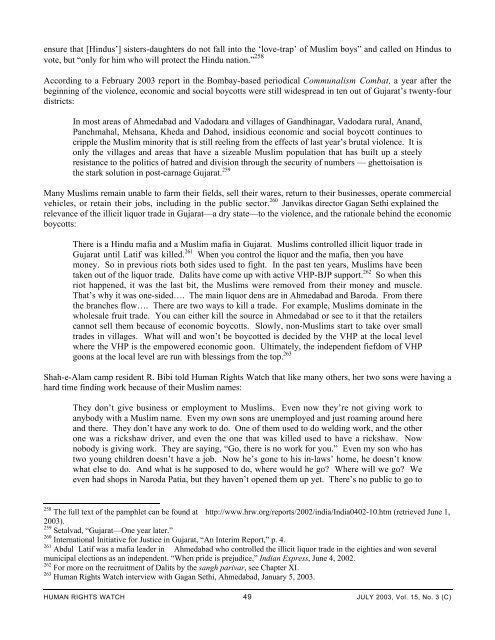We Have No Orders to Save You - Human Rights Watch
We Have No Orders to Save You - Human Rights Watch
We Have No Orders to Save You - Human Rights Watch
You also want an ePaper? Increase the reach of your titles
YUMPU automatically turns print PDFs into web optimized ePapers that Google loves.
ensure that [Hindus’] sisters-daughters do not fall in<strong>to</strong> the ‘love-trap’ of Muslim boys” and called on Hindus <strong>to</strong><br />
vote, but “only for him who will protect the Hindu nation.” 258<br />
According <strong>to</strong> a February 2003 report in the Bombay-based periodical Communalism Combat, a year after the<br />
beginning of the violence, economic and social boycotts were still widespread in ten out of Gujarat’s twenty-four<br />
districts:<br />
In most areas of Ahmedabad and Vadodara and villages of Gandhinagar, Vadodara rural, Anand,<br />
Panchmahal, Mehsana, Kheda and Dahod, insidious economic and social boycott continues <strong>to</strong><br />
cripple the Muslim minority that is still reeling from the effects of last year’s brutal violence. It is<br />
only the villages and areas that have a sizeable Muslim population that has built up a steely<br />
resistance <strong>to</strong> the politics of hatred and division through the security of numbers — ghet<strong>to</strong>isation is<br />
the stark solution in post-carnage Gujarat. 259<br />
Many Muslims remain unable <strong>to</strong> farm their fields, sell their wares, return <strong>to</strong> their businesses, operate commercial<br />
vehicles, or retain their jobs, including in the public sec<strong>to</strong>r. 260 Janvikas direc<strong>to</strong>r Gagan Sethi explained the<br />
relevance of the illicit liquor trade in Gujarat—a dry state—<strong>to</strong> the violence, and the rationale behind the economic<br />
boycotts:<br />
There is a Hindu mafia and a Muslim mafia in Gujarat. Muslims controlled illicit liquor trade in<br />
Gujarat until Latif was killed. 261 When you control the liquor and the mafia, then you have<br />
money. So in previous riots both sides used <strong>to</strong> fight. In the past ten years, Muslims have been<br />
taken out of the liquor trade. Dalits have come up with active VHP-BJP support. 262 So when this<br />
riot happened, it was the last bit, the Muslims were removed from their money and muscle.<br />
That’s why it was one-sided…. The main liquor dens are in Ahmedabad and Baroda. From there<br />
the branches flow…. There are two ways <strong>to</strong> kill a trade. For example, Muslims dominate in the<br />
wholesale fruit trade. <strong>You</strong> can either kill the source in Ahmedabad or see <strong>to</strong> it that the retailers<br />
cannot sell them because of economic boycotts. Slowly, non-Muslims start <strong>to</strong> take over small<br />
trades in villages. What will and won’t be boycotted is decided by the VHP at the local level<br />
where the VHP is the empowered economic goon. Ultimately, the independent fiefdom of VHP<br />
goons at the local level are run with blessings from the <strong>to</strong>p. 263<br />
Shah-e-Alam camp resident R. Bibi <strong>to</strong>ld <strong>Human</strong> <strong>Rights</strong> <strong>Watch</strong> that like many others, her two sons were having a<br />
hard time finding work because of their Muslim names:<br />
They don’t give business or employment <strong>to</strong> Muslims. Even now they’re not giving work <strong>to</strong><br />
anybody with a Muslim name. Even my own sons are unemployed and just roaming around here<br />
and there. They don’t have any work <strong>to</strong> do. One of them used <strong>to</strong> do welding work, and the other<br />
one was a rickshaw driver, and even the one that was killed used <strong>to</strong> have a rickshaw. <strong>No</strong>w<br />
nobody is giving work. They are saying, “Go, there is no work for you.” Even my son who has<br />
two young children doesn’t have a job. <strong>No</strong>w he’s gone <strong>to</strong> his in-laws’ home, he doesn’t know<br />
what else <strong>to</strong> do. And what is he supposed <strong>to</strong> do, where would he go? Where will we go? <strong>We</strong><br />
even had shops in Naroda Patia, but they haven’t opened them up yet. There’s no public <strong>to</strong> go <strong>to</strong><br />
258 The full text of the pamphlet can be found at http://www.hrw.org/reports/2002/india/India0402-10.htm (retrieved June 1,<br />
2003).<br />
259 Setalvad, “Gujarat—One year later.”<br />
260 International Initiative for Justice in Gujarat, “An Interim Report,” p. 4.<br />
261 Abdul Latif was a mafia leader in Ahmedabad who controlled the illicit liquor trade in the eighties and won several<br />
municipal elections as an independent. “When pride is prejudice,” Indian Express, June 4, 2002.<br />
262 For more on the recruitment of Dalits by the sangh parivar, see Chapter XI.<br />
263 <strong>Human</strong> <strong>Rights</strong> <strong>Watch</strong> interview with Gagan Sethi, Ahmedabad, January 5, 2003.<br />
HUMAN RIGHTS WATCH 49 JULY 2003, Vol. 15, <strong>No</strong>. 3 (C)

















